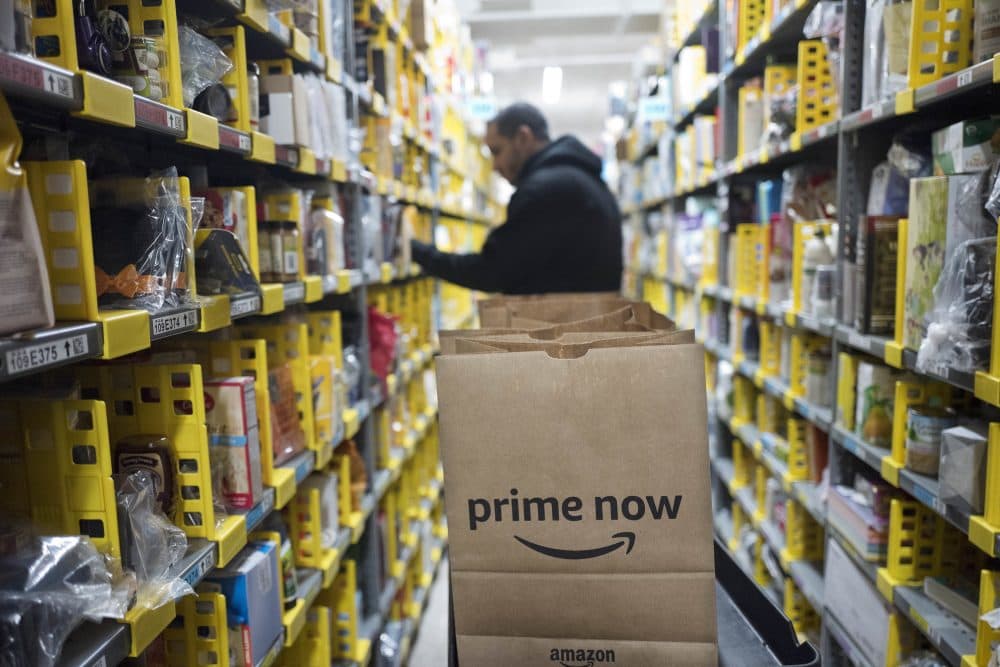Advertisement
6 Things Amazon Wanted To Know About Somerville For Its HQ2 Pitch

11/28 Update: Somerville provided us with its answers to Amazon's questions.
Early childhood STEM training, housing costs and the price of an avocado at a local Whole Foods — all things Amazon wanted to know about its HQ2 finalist cities.
The questions are contained in a 29-page Request for Information (RFI) that Amazon sent to Somerville, one of the cities on the tech behemoth's short-list for its second headquarters. It asks broadly about talent, community growth, real estate, taxes and tax policy, and incentives.
It's not clear whether Amazon sent the same questionnaire to every finalist city, but nothing in the RFI that WBUR received is unique to Somerville.
Somerville and Boston both made the list of finalists, but were snubbed in favor of Crystal City, Virginia, and Long Island City, New York. Somerville had pitched a series of sites snaking along MBTA stops, while Boston proposed Suffolk Downs in East Boston.
Here are six things that stood out to us in the RFI:
1. They want to fill the talent pool early
Among many questions about education, Amazon wanted to know about early childhood STEM initiatives — including how far they are from the proposed HQ2 sites. They asked about SAT and ACT scores for graduates, capital investment in public schools and how funding is allocated to education.
It also wanted to know about colleges and universities nearby — and how many graduates leave the area after getting their diploma.
2. Amazonian quality of life
Nearly three pages of the RFI are dedicated to community and quality of life questions. Amazon wanted to know what kind of indoor and outdoor health and fitness opportunities there are, what festivals take place, and about weekend travel destinations and athletic programs for adults and children.
The company also wanted to know what issues the community is facing, and how the community is dealing with them.
3. Avocado toast and Starbucks
Apparently to gauge the true cost of living for its potential workers, Amazon asked the city to "specify the cost of a basket of goods in your community. The basket is from Whole Foods: gallon of 2% milk, loaf of whole wheat bread, and an avocado."
Whole Foods is, of course, owned by Amazon.
They also wanted to know the cost of Starbucks tall coffee, movie ticket, monthly individual gym membership at a YMCA, dry cleaning of a shirt, and a gallon of gas.
4. Diversity and inclusion
Amazon asked what kind of diversity and inclusion programs are in place among both school systems and leading employers. It asked what the community is doing to support underrepresented minorities in tech, both now and planned for the future. Amazon wanted to know how many foreign-born residents live in the community, and what programs are in place for them.
And Amazon wanted hard data: "An inclusive workplace and community are key to Amazon. Provide data on the median earnings, unemployment, home ownership, educational attainment, and undergrad enrollment gaps for underrepresented minorities in your community. Please further provide data on hate crimes committed in your community."
5. Where will tens of thousands of workers live?
Housing comes up repeatedly in the RFI. "Our employees must be able to find ample housing opportunities. We are well aware of the community housing challenges that often come with economic prosperity," Amazon wrote. "We are willing to partner with your community in addressing the challenges."
Amazon asked for information about: the current housing stock, with granular details about example neighborhoods; cost; and planned housing developments.
6. Show us the money
The last (and perhaps most significant) ask is about incentives. Over four pages, Amazon asked what kind of tax breaks, grants and rate freezes they might get. The company asked the communities to assume that the initial campus would be 500,000 square feet in year one, and 8 million square feet by the end of the project.
They were looking for all sorts of tax credits and exemptions, from film tax credits, property tax reductions, airport fee credits, and grants and loans for workforce education and relocation. They also asked about temporary office space, state financing, site acquisition assistance, forgivable loans and environmental mitigation.
How we got the RFI:
WBUR received the RFI from Somerville as part of a public records request, after the city disclosed in a response to a different records request that it had filled out a "questionnaire" from Amazon on HQ2. (We've asked Somerville and Boston to give us the answers to that RFI, and any other information they sent to Amazon as part of the bid process. We haven't heard back yet.)
Somerville initially declined to provide the blank RFI while the HQ2 search was underway, but provided it to WBUR on Tuesday, a week after Amazon made its selection public. The city redacted the project's code name, saying it was covered by the trade secrets exemption of state public records law.
Boston also refused to provide the questionnaire during the HQ2 search, saying it would "put Boston at a disadvantage by permitting other competing communities to see the unique questions posed by Amazon to Boston."
This article was originally published on November 21, 2018.
